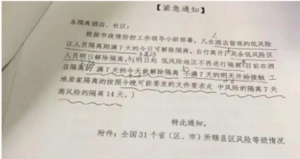 As the world grapples with the prospect of a tsunami of COVID-19 cases over the coming weeks, it has been reported that tourist sites are being reopened by the Chinese authorities in the Kardze Tibetan Autonomous Prefecture in Kham [Ch: Sichuan], including the Chaksam Kha Monastery. Radio Free Asia (RFA) reports that this poses distress and worries for the local Tibetans who are concerned about a flurry of COVID-19 cases coming in the second wave of virus transmission and quotes a source as saying the move is “premature”.
As the world grapples with the prospect of a tsunami of COVID-19 cases over the coming weeks, it has been reported that tourist sites are being reopened by the Chinese authorities in the Kardze Tibetan Autonomous Prefecture in Kham [Ch: Sichuan], including the Chaksam Kha Monastery. Radio Free Asia (RFA) reports that this poses distress and worries for the local Tibetans who are concerned about a flurry of COVID-19 cases coming in the second wave of virus transmission and quotes a source as saying the move is “premature”.
A Chinese tour company has relayed the message that the monastery will be open to a maximum of 4,000 visitors in a day. It has also announced free admission to the medical professionals who were working on the frontlines to treat the coronavirus-infected patients.

Image of the announcement
This comes in conjunction with a notice from the Lhasa City Epidemic Prevention and Control Leading Committee, dated March 23, that communicates the lifting of the quarantine. It mentions, specifically, that people from “low-risk” areas who were hitherto quarantined in hotels, etc, are now free to move out if they have already completed a week in isolation. It also states that people arriving from “low-risk areas” may no longer need to be quarantined; those from areas identified as “medium-risk” are advised to remain in isolation for seven days and the “high-risk” arrivals for 14 days.
RFA quotes local sources as saying that the motive behind the move to reopen tourist sites is to generate a revenue stream to pre-empt the possible impending recession facing the Chinese economy due to the impact of coronavirus, and implying that the authorities are willing to endanger Tibetans for the sake of Chinese business. Tibetans in the area have told RFA they do not approve of this step, given the gravity and reach of the pandemic, and say the local residents are still self-quarantining and following all protective measures. The government claims, however, insist that the cases in the prefecture have all recovered and that the tourist areas are safe to visit.
Tibetan locals say that the move will benefit only the government-run tour companies and operators, with little to no benefit for the livelihoods of the locals residing in the area; their concerns are aggravated by the fact that tourists have been the primary carriers of the virus the world over.




 Print
Print Email
Email